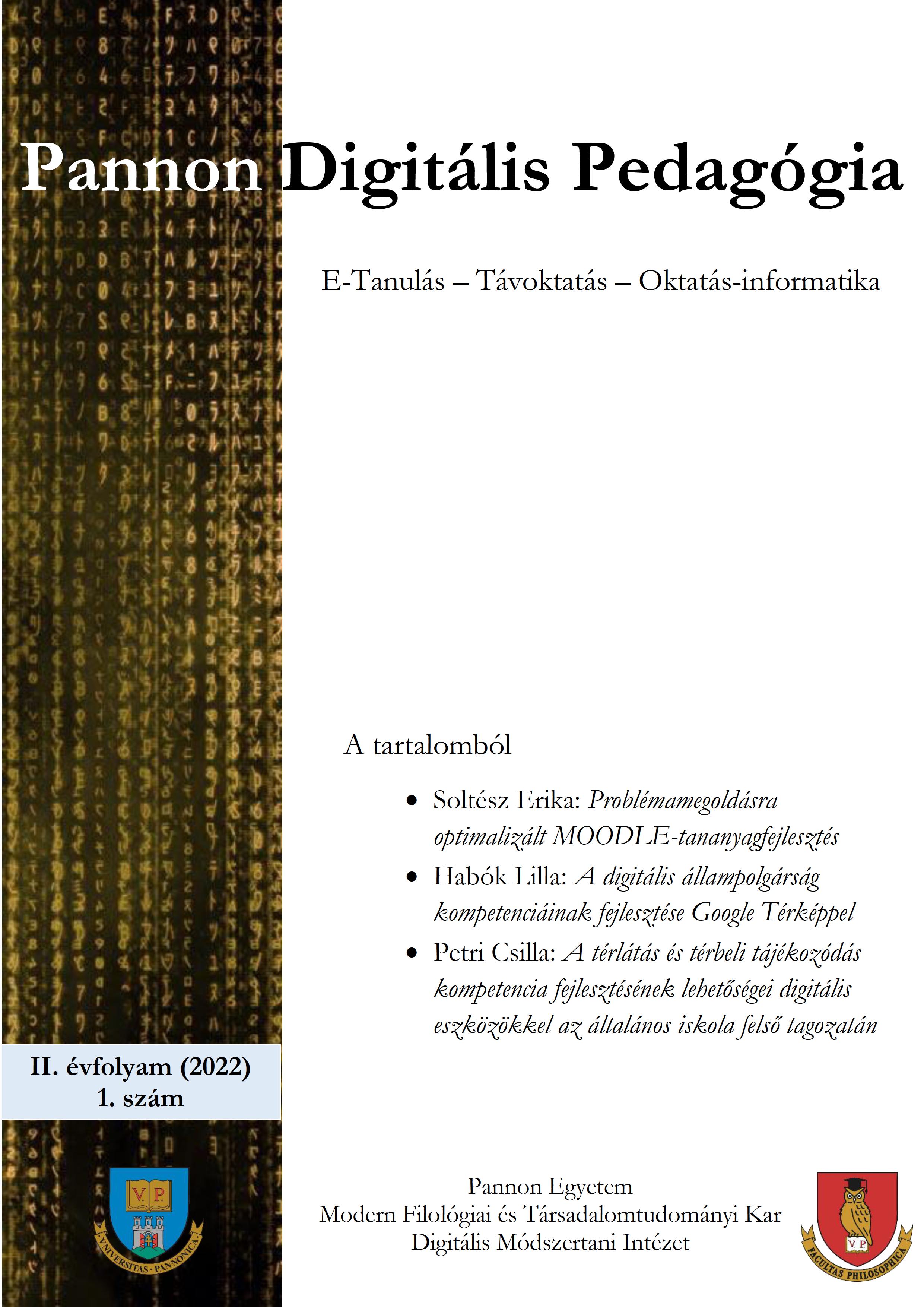Developing digital citizenship competencies with Google Maps
DOI:
https://doi.org/10.56665/PADIPE.2022.1.3Keywords:
digital citizenship, digital competencies, Google MapsAbstract
We call digital citizens the individuals who participate actively, appear in interactions and communicate in the
digital world. They carry out their daily activities, maintain their contacts and information sharing activities within
online environment (Ollé et al., 2013). The study applies the Hungarian Digital Citizenship 2017 model (Hülber
ed.) and shows how the theoretical model can be applied to a specific application, in this case Google Maps and
within that the Local Guides Program. The volunteer program is a feature set through the Google Maps locations can be edited with relevant information, such as basic data, photos, videos, or reviews. What does it mean on GoogleMaps if a user has basic, intermediate, or advanced digital citizenship competencies? Which functions can be applied to different competency levels and how can they be measured or developed within the curriculum? The Digital Citizenship 2017 model includes 4 major competence areas with 14 competences and
3 “transitional” competences. The study provides 3-3 tasks, for a total of 51 task ideas for each competence, which
helps to assess and develop students' readiness for a given digital competence. Google Maps is just one of the many digital tools that helps to develop digital citizenship competencies. The aim of the study is to show how theoretical definitions can be applied to practical functions and tasks in the digital citizenship model rather than to specific applications and specific subject examples.
References
Czirfusz Dóra – Habók Lilla – Lévai Dóra – Papp-Danka Adrienn (2015): Digitális állampolgárság kutatás 2014. Budapest: Oktatási Hivatal. https://www.oktatas.hu/pub_bin/dload/unios_projektek/tamop315/DAK_tanulmanykotet_T315.pdf (Letöltés dátuma: 2022.02.26.)
Dobó István – Lévai Dóra – Tóth Renáta – Papp-Danka Adrienn (2013): Értékteremtés és produktivitás a digitális állampolgárság kompetenciarendszerében = Oktatás-Informatika, 5. évf. 1-2. sz. https://www.oktatas-informatika.hu/2013/11/dobo-istvan-levai-dora-toth-renata-papp-danka-adriennertekteremtes-es-produktivitas-a-digitalis-allampolgarsag-kompetenciarendszereben/ (Letöltés dátuma: 2022.02.26.)
Hülber László (2017, szerk.): A digitális-alapú iskolafejlesztési módszert megalapozó háttértanulmányok. https://drive.google.com/drive/folders/1f9wNZ_L7yUGz-zQnOFni6iI9_2WPK5vW (Letöltés dátuma: 2022.02.26.)
Ollé János – Lévai Dóra – Domonkos Katalin – Szabó Orsi – Papp-Danka Adrienn – Czirfusz Dóra – Habók Lilla – Tóth Renáta – Takács Annita – Dobó István (2013): Digitális állampolgárság az információs társadalomban. Budapest: ELTE Eötvös Kiadó. https://www.eltereader.hu/media/2014/01/Digitalis_allampolgarsag_READER.pdf (Letöltés dátuma: 2022.02.26.)
Papp-Danka Adrienn – Lanszki Anita (2017): A Digitális Állampolgárság újraértelmezett kompetenciamodellje. In: Hülber László (szerk.): A digitális-alapú iskolafejlesztési módszert megalapozó háttértanulmányok. (pp.: 101- 121.) https://drive.google.com/drive/folders/1f9wNZ_L7yUGz-zQnOFni6iI9_2WPK5vW (Letöltés dátuma: 2022.02.26.)
Vuorikari, Riina – Punie, Yves – Carretero Gomez Stephanie – Van Den Brande, Godelieve (2016): DigComp 2.0: The Digital Competence Framework for Citizens. Update Phase 1: The Conceptual Reference Model. Luxembourg Publication Office of the European Union. https://publications.jrc.ec.europa.eu/repository/handle/JRC101254 (Letöltés dátuma: 2022.02.26.)
Downloads
Published
Versions
- 2023-01-17 (3)
- 2022-09-27 (2)
- 2022-09-26 (1)

